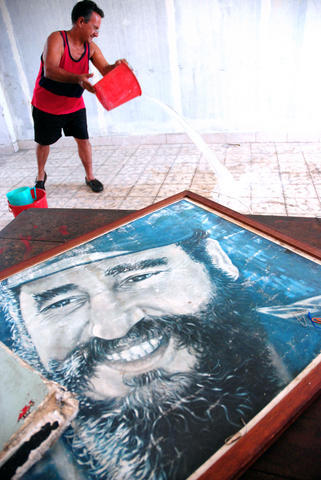Cuban President Fidel Castro hasn't been seen in public for nearly 18 months and says he is too sick to campaign. But that still hasn't stopped the 81-year-old from standing for re-election in parliamentary elections yesterday.
Some 8.4 million voters are being asked to back Castro and 613 other top Communists, career politicians, musicians and athletes for posts in the island's rubber-stamp legislature, known as the National Assembly.
Castro, Cuba's unchallenged "Maximum Leader" since 1959, ceded power to his younger brother Raul following emergency intestinal surgeries in July 2006 and is still recovering from an undisclosed illness at a secret location.

PHOTO: AFP
Although he no longer runs the government, Castro still heads of its supreme governing body, the Council of State, and his re-election to parliament is necessary to retain that position.
Following the vote, lawmakers have 45 days to choose among their colleagues for a new Council of State, meaning a decision on whether Castro will remain president or permanently retire could come by March.
Voters at district polling places overseen by schoolchildren are given a list of candidates -- just one per post. They are encouraged to check a single box supporting the full slate, although if they object to some candidates, they can mark individual boxes by names they support and leave others blank.
Candidates who don't get more than 50 percent of the vote lose, although National Assembly officials don't remember that happening since Cubans began voting for their parliament in 1993.
Cuba now elects a new parliament every five years, and while organized campaigning is forbidden, candidates are encouraged to interact with district voters and their resumes are posted at the polls. The Communist Party is the only party allowed.
Preliminary returns should be ready quickly, as electoral officials use ham radios or even carrier pigeons to report results from isolated mountains and corners of the countryside after polls close.
Castro, who has been penning essays for publication in state newspapers, wrote last month that he has no intention of clinging to power or standing in the way of a new generation of leaders. But he also praised the example of a celebrated Brazilian architect who is still working at 100.
"I am not physically able to speak directly to the citizens of the municipality where I was nominated for our elections," he wrote on Wednesday.
"I do what I can: I write," he added, seeming frustrated. "Writing is not the same as speaking."
The government said more than 95 percent of voters were to participate in yesterday's vote, but the US government dismisses the process as a sham.
"These elections are not a break with past practice in Cuba and do not represent a real opportunity for the Cuban people to decide for themselves how they will be governed and who will govern them," said Kurtis Cooper, a State Department spokesman, in Washington on Friday.

Tens of thousands of Filipino Catholics yesterday twirled white cloths and chanted “Viva, viva,” as a centuries-old statue of Jesus Christ was paraded through the streets of Manila in the nation’s biggest annual religious event. The day-long procession began before dawn, with barefoot volunteers pulling the heavy carriage through narrow streets where the devout waited in hopes of touching the icon, believed to hold miraculous powers. Thousands of police were deployed to manage crowds that officials believe could number in the millions by the time the statue reaches its home in central Manila’s Quiapo church around midnight. More than 800 people had sought

DENIAL: Pyongyang said a South Korean drone filmed unspecified areas in a North Korean border town, but Seoul said it did not operate drones on the dates it cited North Korea’s military accused South Korea of flying drones across the border between the nations this week, yesterday warning that the South would face consequences for its “unpardonable hysteria.” Seoul quickly denied the accusation, but the development is likely to further dim prospects for its efforts to restore ties with Pyongyang. North Korean forces used special electronic warfare assets on Sunday to bring down a South Korean drone flying over North Korea’s border town. The drone was equipped with two cameras that filmed unspecified areas, the General Staff of the North Korean People’s Army said in a statement. South Korea infiltrated another drone

COMMUNIST ALIGNMENT: To Lam wants to combine party chief and state presidency roles, with the decision resting on the election of 200 new party delegates next week Communist Party of Vietnam General Secretary To Lam is seeking to combine his party role with the state presidency, officials said, in a move that would align Vietnam’s political structure more closely to China’s, where President Xi Jinping (習近平) heads the party and state. Next week about 1,600 delegates are to gather in Hanoi to commence a week-long communist party congress, held every five years to select new leaders and set policy goals for the single-party state. Lam, 68, bade for both top positions at a party meeting last month, seeking initial party approval ahead of the congress, three people briefed by

Indonesia and Malaysia have become the first countries to block Grok, the artificial intelligence (AI) chatbot developed by Elon Musk’s xAI, after authorities said it was being misused to generate sexually explicit and nonconsensual images. The moves reflect growing global concern over generative AI tools that can produce realistic images, sound and text, while existing safeguards fail to prevent their abuse. The Grok chatbot, which is accessed through Musk’s social media platform X, has been criticized for generating manipulated images, including depictions of women in bikinis or sexually explicit poses, as well as images involving children. Regulators in the two Southeast Asian